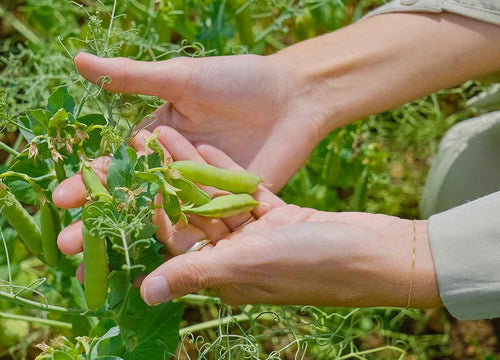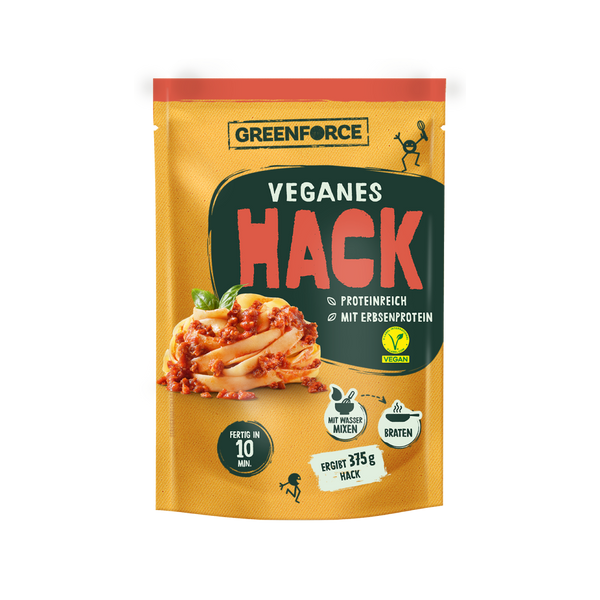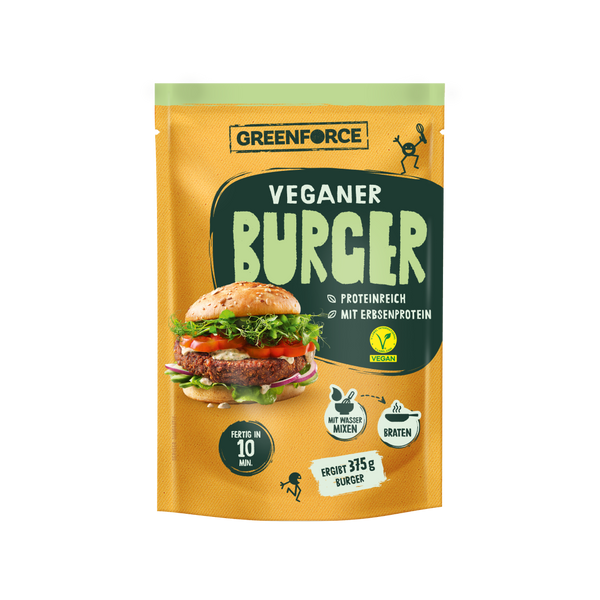Carbohydrate intolerance: Counteract it with a vegan diet
Theresa Aicher
31/01/23
Reading time: 8 minutes
Do you suffer from symptoms such as flatulence, a bloated stomach or recurring diarrhea? Then this could be due to carbohydrate intolerance.
Such intolerance is triggered when there is a deficiency in certain intestinal enzymes. This means that your gastrointestinal tract is no longer able to digest all carbohydrates .
Basically, the symptoms can be treated comparatively easily : you just have to eliminate the carbohydrates from your diet , which are part of certain foods and are responsible for the intestinal problems.
Disaccharides as the cause of intestinal problems
These carbohydrates are so-called disaccharides . These consist of two simple sugars (monosaccharides) that have formed a glycosidic connection with each other. Typical representatives of this form of carbohydrates are lactose (milk sugar), sucrose (table sugar) and maltose (malt sugar).
To determine whether you suffer from a corresponding intolerance, you can get a clinical diagnosis . This is usually confirmed by a hydrogen (H2) breath test.
What exactly happens in the intestines when there is carbohydrate intolerance?
Normally, lactose, sucrose, maltose and the other disaccharides are broken down into simple sugars. This process is activated by enzymes located in the brush border of the small intestinal cells .
If there is a deficiency of this type of enzyme, some disaccharides cannot be digested properly . This then leads to problems such as diarrhea due to water and electrolyte retention in the intestinal lumen. Problems can also arise during fermentation.
Food is actually transformed during fermentation to suit the body. This happens with the support of friendly microorganisms . However, if bacterial fermentation of carbohydrates occurs in the main part of the large intestine (also known as the colon), this manifests itself in excessive gas formation from methane, carbon dioxide and hydrogen.
This causes a feeling of tension in the abdomen, abdominal pain, bloating and sometimes excessive indigestion (known in technical jargon as flatulence).

These forms of enzyme deficiency are well known
A corresponding deficiency of enzymes can have three different causes . If there is a deficiency of sucrase-isomaltase or lactase, doctors speak of congenital causes.
Example of lactase deficiency : From a pathophysiological perspective, lactose malabsorption is caused by a lactase deficiency.
This is an enzyme that is able to break down all sugar substances into simpler or simpler building blocks . However, enzyme expression decreases significantly in adulthood. Interesting fact: In the Nordic countries in particular, this decrease in enzyme expression is much smaller than in other regions.
Due to the lack of lactase, lactose cannot be broken down into absorbable galactose and glucose . In contrast, malabsorption of sorbitol and fructose is caused by a deficiency in GLUT5.
This is an important transport protein: The carbohydrates that are not broken down or digested in the intestine are fermented in the colon by the microbiome (fungi, viruses, bacteria, fungi and protozoa). This results in, among other things, osmotically active metabolites and gases.
Congenital enzyme deficiency caused by irritable bowel syndrome
There is another special feature to note here. Carbohydrate intolerance, which arises from a deficiency of lactase , is regularly associated with irritable bowel syndrome.
Researchers and scientists suspect that those affected by irritable bowel syndrome react more sensitively to the consequences of malabsorption. This information was provided, for example, by a meta-analysis with genetic testing , lactose tolerance testing and lactose breathing.
Carbohydrate intolerance - characteristics
However, the most common form of carbohydrate intolerance is acquired lactase deficiency. The symptoms are sometimes caused by another illness or intestinal disease.
For example, especially in the case of celiac disease (gluten intolerance) or Crohn's disease and similar chronic inflammations of the small intestinal mucosa, lactase deficiency and thus carbohydrate intolerance occur. In addition , carbohydrate intolerance can be acquired after infancy .
Newborns have a very high level of lactase, which allows breast milk to be digested by breaking down the milk sugar it contains . After weaning, the levels drop dramatically. This has been proven primarily among people of color, Latin Americans and Asians.
This means that older people from these ethnic groups often have digestive problems when they consume significant amounts of milk or milk products . In this case, your body is no longer able to adequately digest the lactose.
Secondary intolerance is usually only temporary
If, on the other hand, the small intestinal mucosa is damaged, doctors speak of a secondary lactase deficiency. This occurs, for example , in acute intestinal infections or celiac disease . In children, secondary lactase deficiency can also occur as a result of surgical procedures.
As a rule, however, this is only of a temporary nature. In general , the activity of the symptom increases again in sick people when the underlying disease has been successfully treated and eliminated.
Food restriction as an effective measure for carbohydrate malabsorption
To control carbohydrate intolerance , you should pay close attention to the ingredients of the food when eating. In this case, that means avoiding non-absorbable sugar. A lactose-free or low-lactose diet is recommended here.
Depending on the extent of lactose malabsorption, some sufferers can tolerate up to 18 grams of lactose per day. It is therefore not necessary to completely avoid lactose intake .
Regardless, a vegan diet is the best option here. Vegan products are basically lactose-free as they do not naturally contain any lactose.
Vegan milk alternatives are also suitable for people with lactose intolerance. Milk sugar is not one of the ingredients or components here either. You should stay away from legumes and brassicas, as these contain the indigestible carbohydrates raffinose and stachyose .
Both are bacterially fermented in the large intestine. This sometimes causes a massive impairment of digestion , which is usually associated with corresponding symptoms such as flatulence, diarrhea or a feeling of fullness.

Carbohydrate intolerance - this vegan diet is recommended
As a vegan, you don't have to go without a diet rich in fiber . The company Greenforce, which is known for its sustainable products, offers an extensive range of plant-based products .
But what are high-fiber foods if legumes and cabbage are eliminated? In this case you should :
- Whole grain products,
- Potatoes,
- citrus fruits,
- Berry,
- peppers and
- Have carrots on the menu.
You will also find suitable vegan food products in the culinary repertoire if, for example, you suffer from a rye allergy or fat intolerance.
You can also take vegan vitamins through food supplements . You should focus on iron, calcium, iodine, omega-3 fatty acids, selenium, zinc and B vitamins .
You can also get a honey alternative for sweetening dishes from Greenforce . This means you can simply avoid foods that cause or worsen the symptoms of a carbohydrate-intolerant intestine .































